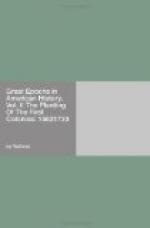The colony of Massachusetts Bay was at this time limited to a district covering not more than twenty or thirty miles from the sea, and its greatest poverty, as Cotton stated, was a poverty of men. And yet the colony was to lose part of its scanty store of men. Three of the eight Massachusetts towns, Dorchester, Watertown, and Newtown (now Cambridge), had been at odds with the other five towns on several occasions; and the assigned reasons are apparently so frivolous as to lead to the suspicion that some fundamental difference was at the bottom of them. The three towns named had been part of the great Puritan influx of 1630. Their inhabitants were “newcomers,” and this slight division may have been increased by the arrival and settlement, in 1633, of a number of strong men at these three towns, notably Hooker, Stone, and Haynes at Newtown. Dorchester, Watertown, and Newtown showed many symptoms of an increase of local feeling: the two former led the way, in October, 1633, in establishing town governments under “selectmen;” and all three neglected or evaded, more or less, the fundamental feature of Massachusetts policy,—the limitation of office-holding and the elective franchise to church-members. The three towns fell into the position of the commonwealth’s opposition, a position not particularly desirable at the time and under all the circumstances.
The ecclesiastical leaders of Dorchester were Warham and Maverick; of Newtown, Hooker and Stone; of Watertown, Phillips. Haynes of Newtown, Ludlow of Dorchester, and Pynchon of Roxbury, were the principal lay leaders of the half-formed opposition. Some have thought that Haynes was jealous of Governor Winthrop, Hooker of Cotton, and Ludlow of everybody. But the opposition, if it can be fairly called an opposition, was not so definite as to be traceable to any such personal source. The strength which marked the divergence was due neither to ambition nor to jealousy, but to the strength of mind and character which marked the leaders of the minority.
Thomas Hooker and Samuel Stone were of Emmanuel College, Cambridge. Hooker began to preach at Chelmsford in 1626, and was silenced for non-conformity in 1629. He then taught school, his assistant being John Eliot, afterward the apostle to the Indians; but the chase after him became warmer, and in 1630 he retired to Holland and resumed his preaching. In 1632 he and Stone came to New England as pastor and teacher of the church at Newtown; and the two took part in the migration to Hartford. Here Hooker became the undisputed ecclesiastical leader of Connecticut until his death in 1647. John Warham and John Maverick, both of Exeter in England, came to New England in 1630, as pastor and teacher of Dorchester. Maverick died while preparing to follow his church, but Warham settled with his parishioners at Windsor, and died there in 1670. George Phillips, also a Cambridge man, came to New England in 1630, as pastor of the church at Watertown. He took no part in the migration, but lived and died at Watertown. Fate seems to have determined that Wendell Phillips should belong to Massachusetts.




